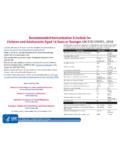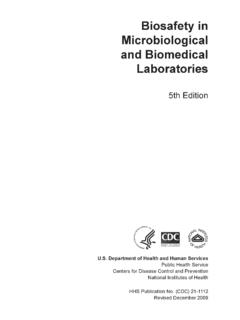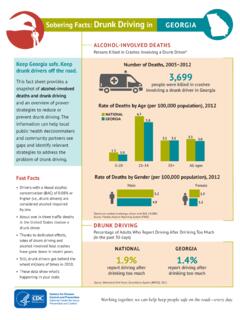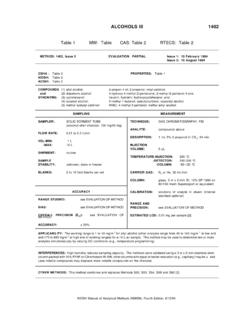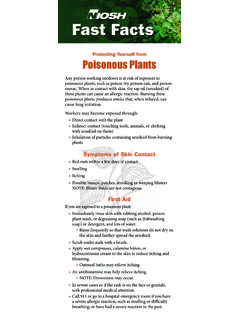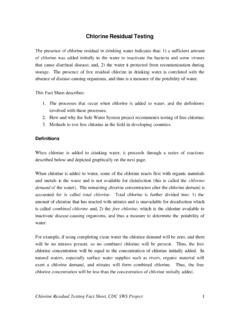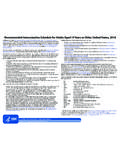Transcription of Recommended Training Effectiveness Questions For ...
1 Recommended Training Effectiveness Questions For Postcourse Evaluations User GuideRecommended Training Effectiveness Questions For Postcourse Evaluations User Guide2 AcknowledgementsDr. Lori Wingate, Director of Research, The Evaluation Center at Western Michigan University, contributed to the development of this material thanks to the CDC Program Performance and Evaluation Office Subject Matter Expert mechanism. Dr. Will Thalheimer, President, Work-Learning Research and Dr. Jonathan (Brent) Vickers, Associate Service Fellow, CDC National Center for Health Statistics also contributed subject matter CitationCenters for Disease Control and Prevention.
2 Recommended Training Effectiveness Questions For Postcourse Evaluations User GuideAtlanta, GA: CDC, 2019. 3 Recommended Training Effectiveness Questions For Postcourse Evaluations User GuideContentsSECTION 1 Executive Summary ..4 SECTION 2 Rationale for Development ..6 SECTION 3 Recommended Questions with Rationale ..7 Recommended Questions for Use Immediately after Training Ends ..7 Recommended Questions for Delayed Evaluation ..10 SECTION 4 Methods ..12 SECTION 5 Additional Training Evaluation Resources ..13 SECTION 6 References ..144 Recommended Training Effectiveness Questions For Postcourse Evaluations User GuideSECTION 1 1 Executive SummaryTarget Audience: This document is intended for anyone interested in designing Training course evaluations that can give better predictions about learning Are the Questions ?
3 The table below lists the Questions Recommended for use immediately after the course ends, and the related construct being measured. Section 3 includes additional Use the Questions ? The Recommended Questions focus on constructs that exhibit strong, consistent relationships with learning and the transfer of learning, are not difficult to measure and can be measured in a variety of Training settings ( , in-person and web-based settings) with adult professional : For further information on why each question was selected and recommendations for how or when to use each question, see Section 3 of this Training Effectiveness Questions for Postcourse Evaluations ConstructQuestionLearningRate your knowledge of (or skill in) the course topic before the course.
4 Not at all knowledgeable Slightly knowledgeable Moderately knowledgeable Very knowledgeable Extremely knowledgeableLearningRate your knowledge of (or skill in) the course topic now after the course. Not at all knowledgeable Slightly knowledgeable Moderately knowledgeable Very knowledgeable Extremely knowledgeableRelevanceHow relevant is this course to your current work? Not at all relevant Slightly relevant Moderately relevant Very relevant Extremely relevantCharacteristics of trainingWhat is your opinion of the balance of lecture and interactivity in this course? Too much lecture and not enough interactive learning Right amount of both lecture and interactive learning Too much interactive learning and not enough lectureIntent to use or applyWill you use what you learned in this course in your work?
5 Definitely not Probably not Possibly Probably yes Definitely yes Not applicable I did not learn anything new from this courseContinued5 Recommended Training Effectiveness Questions For Postcourse Evaluations User GuideConstructQuestionSuspected Barriers to Use or ApplicationWhat factors will keep you from using the content of this course in your work? (Select all that apply) I need additional Training in the subject matter I will not have the resources I need I will not be provided opportunities to use what I learned I will not have the time to use what I learned My supervisor will not support me in using what I learned My colleagues will not support me in using what I learned The course content is not relevant to my current work Other (please specify):Intent to Use or ApplyWhat, if anything, do you plan to use from this course?
6 (open-ended) Training WeaknessesHow could this course be improved to make it a more effective learning experience? (open-ended) Training StrengthsWhat part of this course was most helpful to your learning? (open-ended)6 Recommended Training Effectiveness Questions For Postcourse Evaluations User GuideSECTION 2 2 Rationale for DevelopmentGuided by the learning research, the goal of these Recommended Questions is to help you develop Training evaluations that reveal insights on Training Effectiveness . There are many constructs you could target in Questions you ask learners. The constructs you choose will determine the information you capture and the conclusions you might draw from the data.
7 Traditionally, Training evaluations have focused on the reputation of the Training and the satisfaction of the learners. Unfortunately, as research has shown, this focus creates data that is inadequate in determining the Effectiveness of Therefore, to help guide the design of Training evaluations, focus on constructs with the strongest, most consistent relationships with learning and the application of knowledge and skills in the workplace (a concept known as transfer of learning). The Recommended Questions presented in this document are evidence-based and are meant to help you ask about the elements of Training that matter the Training Effectiveness Questions For Postcourse Evaluations User GuideSECTION 3 3 Recommended Questions with RationaleRecommended Questions for Use Immediately after Training EndsThe Recommended Questions highlighted below are applicable in most Training evaluations.
8 These constructs exhibit strong, consistent relationships with learning and the transfer of learning, are not difficult to measure, and can be measured in different Training settings (in-person and web-based settings) with adult professional the Recommended Questions are better predictors of Training Effectiveness than many traditional Questions found on Training evaluations, they should still be coupled with objective measures of learner knowledge, recall, and application when possible. Construct: LearningQuestionResponse OptionsRationaleCaveats and ContextRate your knowledge of (or skill in) the course topic before the course. Not at all knowledgeable Slightly knowledgeable Moderately knowledgeable Very knowledgeable Extremely knowledgeableIf you are limited to self-assessments of learning after a Training , respondents can rate their knowledge of (or skill in) the topics before and after the Training in a retrospective pre- or postformat (where pre- or postratings are provided at the same time).
9 2,3 It is valuable to have items that give respondents the opportunity to express how much they believe they learned as a result of a learner s perceived understanding or perceived learning is generally not a strong predictor of Training Effectiveness . The best way to measure understanding or comprehension is with tests of learning, not with self-assessments by ,12 Nonetheless, it is still important to measure perceived understanding or learning on posttraining evaluations for two primary reasons:1. As a proxy if you are not adequately measuring understanding or comprehension in objective ways; and2. For comparability. It is important to understand if our learners perceived understanding or learning matches objective measures of understanding or learning.
10 Having both self-report and objective measures will allow us to assess the validity of self-report assess learning, this question must be asked together with the next question. This question can be used to assess either general knowledge or skill, depending on what is covered in the Training . It can also be adapted to assess accomplishment of specific learning Training Effectiveness Questions For Postcourse Evaluations User GuideConstruct: LearningQuestionResponse OptionsRationaleCaveats and ContextRate your knowledge of (or skill in) the course topic now after the course. Not at all knowledgeable Slightly knowledgeable Moderately knowledgeable Very knowledgeable Extremely knowledgeableIf you are limited to self-assessments of learning after a Training , respondents can rate their knowledge of (or skill in) the topics before and after the Training in a retrospective pre- or postformat (where pre- or postratings are provided at the same time).
